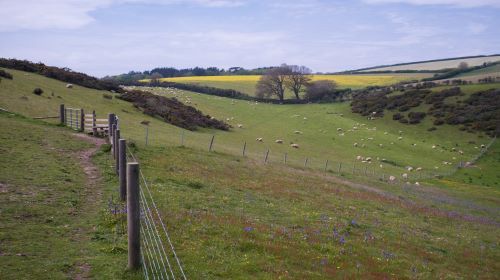
20 May 2022
Defra has published the 2022 update on the government’s 25 Year Environment Plan (25 YEP) outcome indicator framework. An assessment of change for a soil health indicator is yet to be undertaken due to a lack of baseline data, meaning we are yet to know whether any progress has been made by the government in reaching its 25 YEP aim of having sustainably managed soils in England by 2030.
In the last 17 years, flying insects have declined by 60% in the UK, according to a citizen survey undertaken by Buglife and Kent Wildlife Trust. Degraded environments and landscapes including soils have contributed to this decline and have been shown by the survey to be in poor health. The survey highlighted the need for bigger habitats and wildlife corridors in landscapes to support nature recovery.
Imported soils are causing damage to UK soils and biodiversity. In response the Wildlife and Countryside Link call for import restrictions on plants and gardeners to ‘buy British’ plants. Non-native invasive species that have arrived in the UK from imported soils, such as the Spanish slug, are harming life in UK soils through eating garden plants and being inedible for hedgehogs or birds.
Sadhguru, founder and leader of the Save Soil campaign suggests the need for a similar Montreal Treaty on soils. The 1987 Montreal Treaty was a global agreement on phasing out ozone-depleting chemicals. At the 15th Conference of Parties (COP15) to the United Nations Convention to Combat Desertification (UNCCD), Sadhguru argued for a global agreement on soil targets, particularly around soil organic matter.
Yeo Valley dairy company aims to increase farm soil carbon by 25% in 40 years. It hopes to achieve this increase at its two dairies in Somerset through its regenerative organic farming project. The project will focus on practices such as mob-grazing where cows are moved around fields regularly allowing grass to grow back and absorb carbon, and composting farmyard manure.
Nestlé and Anglian Water have invested in a landscape initiative across East Anglia as part of a new trading community called Landscape Enterprise Networks (LENs). Under the scheme, farmers are being funded to implement regenerative farming measures which will deliver benefits including improving water quality and availability, preventing flooding and soil erosion, regenerating soils, reducing carbon emissions, capturing carbon, and enhancing biodiversity.
Research by the Swedish University for Agricultural Sciences raises the question of how heavy farm machinery is causing more major impacts on soils today than previously heavier dinosaurs. The study saw combine harvesters weighing 36,000kg when fully loaded forcing air out of soils and compacting them which prevents plants from being able to grow. It suggested that dinosaurs compacted soils less by keeping to set paths and using their long necks to reach food.
A study finds local by-products can be used to reestablish vegetation on soils after roadworks. Vegetation has to be re-established on soils affected by roadworks to reduce flood risks and secure embarkments next to roads. By-products from local tree works such as tree bark and local council street waste are effective at helping vegetation re-grow on soils.
Soil microbes use different biochemical processes to process nutrients. A new study finds that soil microbes absorb carbon through different biochemical pathways, which could affect how soils are used to mitigate climate change. The report concluded the need for further research into the variations in soil microbial biochemistry.
Scientists have managed to grow plants in soil from the moon for the first time. Thale cress successfully sprouted in soils collected from the moon. This offers the potential for plants to be grown on the moon to provide both food and oxygen.